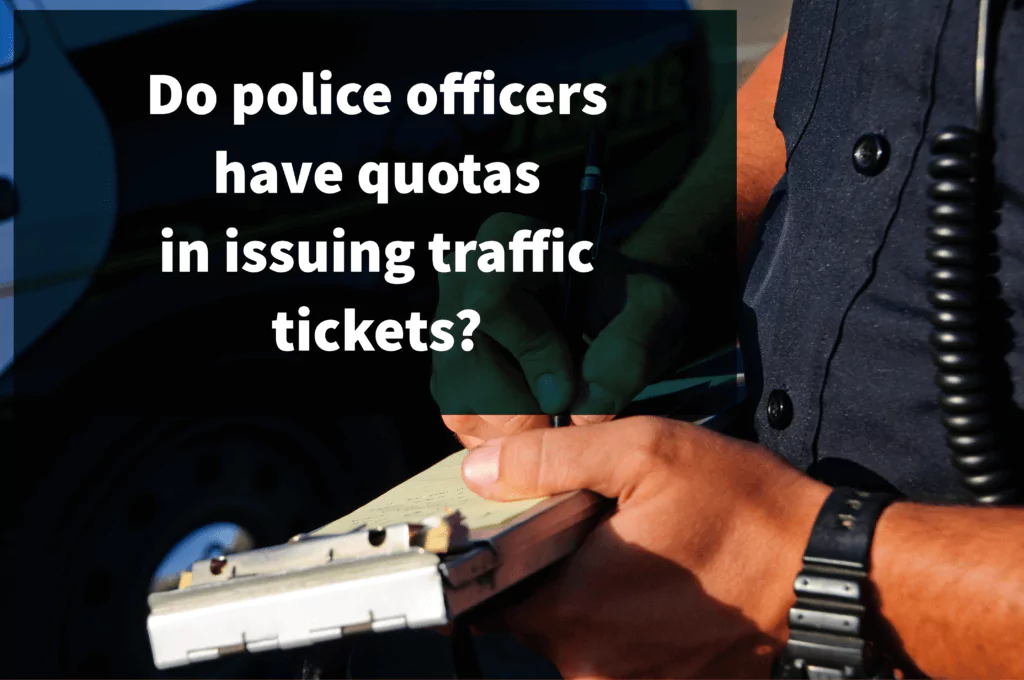
Do police officers have quotas? We hear from drivers all the time that the moving violation traffic ticket they received must have been issued because the officer needed to meet his “quota” or the day or week or month or location, etc. The theory is based on a belief that officers are instructed as part of their job to issue a certain number of summonses over a certain period of time.
We have been told on numerous occasions by police officers we interact with that there are no such quotas. A true “quota” can never be allowed to exist because that would put officers in a position where they may need to issue summonses up against a clock (not just based on merit) when necessary. This would of course bring into question the legitimacy of any such summonses issued.
However, while specific quotas based on specific deadlines might not technically exist, we do still recognize that there are certain “performance numbers” that officers may be expected to reach. It might not be a very specific number but there must be some indicator to higher enforcement officers regarding the job performance of officers issuing tickets.
A police quota is the idea that police officers must issue a certain number of traffic tickets during a given period. A quota could be imposed by police chiefs who are pressured by politicians and community groups to enforce “tough on crime” policies. This can, unfortunately, lead to summonses or charges that are brought more because the officer feels obligated to do so rather than because the officer observed a legitimate illegal act.
When someone is issued a traffic violation at the end of a month that they felt they didn’t deserve, we’ll often hear the person argue that it was only written because the officer had some quota to meet.
The biggest problem with police quotas is that they create an incentive for police officers to use more aggressive enforcement techniques than they would otherwise use in order to satisfy their job requirements or the demands of their supervising officers.
Officers may look to target drivers they otherwise would leave alone, like those making a benign turn without using a signal or those speeding ever so slightly over the posted speed limit. In other situations, officers might look to add on “companion” summonses or charges for secondary items (various equipment violations) or duplicative items (using creative ticket writing to write multiple violations based off a single act).
True quotas would not make the roads any safer. Moreover, they would be unfair–the last thing anyone would want is to cross paths with an officer who is under a deadline of sorts to charge someone with something.
Unfortunately, the lack of true official “quotas” doesn’t mean the concept of performance standards for officers doesn’t exist. If two officers are sent out to the same location on alternating days and one issues 50 tickets in a week and the other 12, what would a superior officer say to the one issuing 12? It’s like any other job and he may be questioned about his effort or focus. Once questioned, does he feel pressure to write more summonses next time out? While that’s not a true specific quota, you can see how officers may have some general “number” in their head that they need to reach prior to the end of a day or week or month.
If you have been issued a traffic ticket for a violation that you believe was wrongfully issued and you’d like to fight, contact TicketHelp. We can help you avoid attending court and minimize or eliminate any of the points or potential insurance increases that might come with a conviction.
We have organized a statewide network of attorneys. In our network are both attorneys who work for Feifer & Greenberg and attorneys who work for other firms that regularly provide of-counsel representation to our clients. This statewide network allows us to match clients in a particular county or court with local attorneys who regularly appear on similar matters in the same county or court. It enables us to help clients anywhere in New York State and in our opinion provide particularly effective and affordable representation for our clients. Local attorneys can draw on their particular local experiences and, with travel time and expense removed from the equation, help us keep our legal fees low.
We recommend fighting almost all tickets. Even if the current NY traffic tickets aren’t particularly harmful, you have an incentive to keep your record clean for the future. Convictions quickly lead to surcharges, insurance increases and other complications. You should strongly consider any decision to pay a ticket without fighting.
Our lawyers are experienced, prepared attorneys who understand the nuances of fighting traffic tickets. Experience, preparation and good decision making help us to help our clients avoid points, surcharges, insurance increases and the other negatives that can easily result from a traffic ticket.
Feifer & Greenberg, LLP, 15 Maiden Lane, Suite 508, New York, NY 10038, (888) 842-5384
© 2023 | Privacy Policy